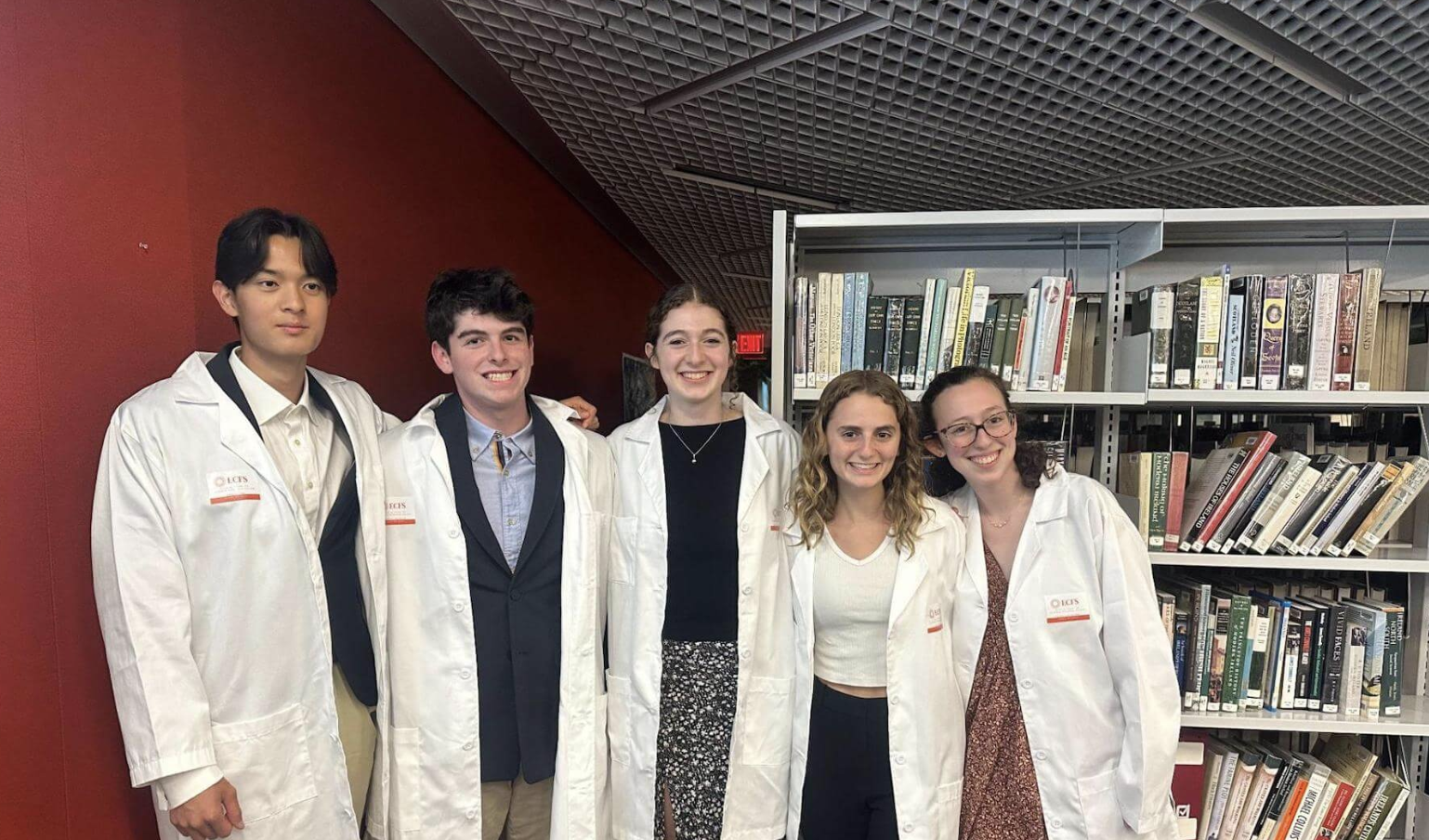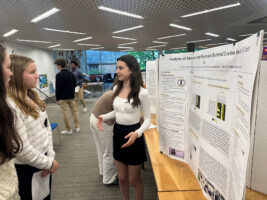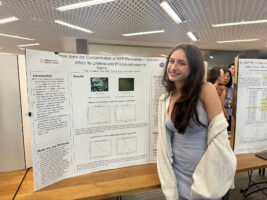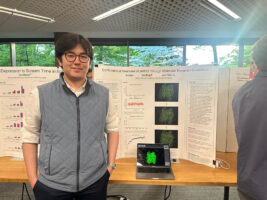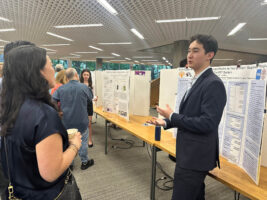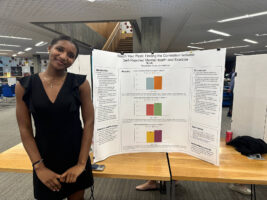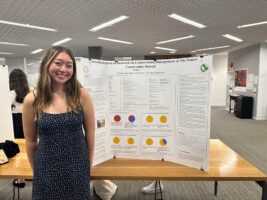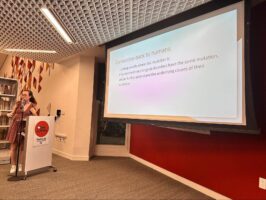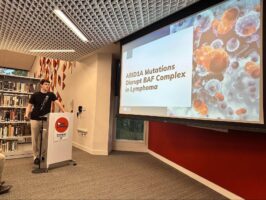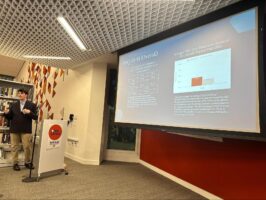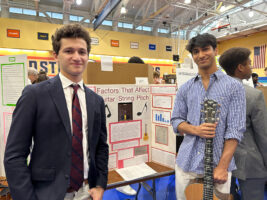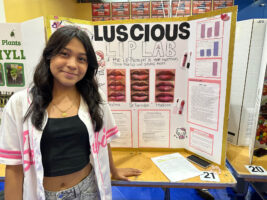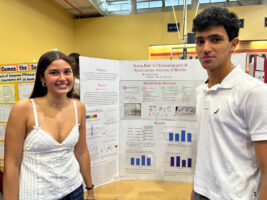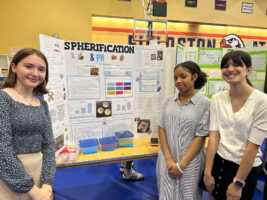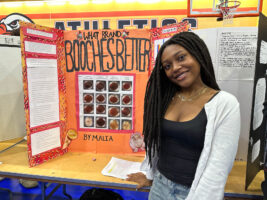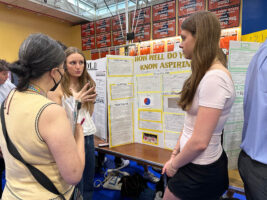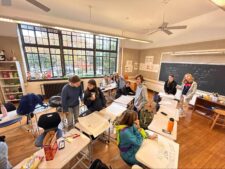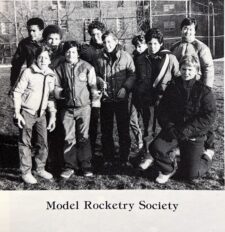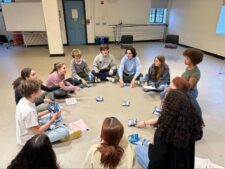On a cool evening in May, the Tate Library at Fieldston Upper was buzzing with knowledge and excitement as students, families, and faculty gathered for the annual Science Research Symposium.
This event showcases the remarkable achievements of the Fieldston Upper Science Research Program (FSRP), tailored for highly motivated and independent learners passionate about scientific research. The program spans two years and incorporates a summer research component, during which students gain expertise in advanced laboratory methods, experimental design, scientific writing, and data analysis. Program requirements also entail a sense of self-sufficiency as students are encouraged to pursue research possibilities independently.
“Students have to find a lab to work in for the summer,” explains Science Teacher and Green Dean Howie Waldman, who oversees FSRP. “They read about labs at various institutions during the academic year and write to the Principal Investigators (PIs) at those labs asking to be interns. This incentivizes responsibility and consistency and gives them time to practice reading difficult texts. This opportunity also gives the students practice interviewing, which is an important skill.”
This year’s symposium was especially significant, as it marked the completion of the inaugural cohort of the Glen de Vries ’90 Science Research Fellowship Program. This program formalized a third year of the program, specifically for students demonstrating exceptional scientific prowess and seeking an even more challenging experience. This distinguished fellowship, named in honor of the late de Vries, a revered scientist, founder of Medidata Solutions, and ECFS alum, represents a new era in scientific inquiry at Fieldston Upper. The first cohort of Glen de Vries ’90 Science Research Fellows — Sam W. ’24, Abigail B. ’24, Daniel L. ’24, Rachel Y. ’24, and Ava M. ’24 — embarked on ambitious research journeys, collaborating with esteemed institutions such as Mount Sinai’s Nestler Lab and Columbia University’s Hospital Center for Pediatrics.
Alongside projects from the de Vries scholars, the event highlighted intellectual curiosity and scientific rigor, with over twenty second and third-year FSR students fearlessly presenting their findings to peers and families. Their projects spanned a broad spectrum of topics, from the effects of deep brain stimulation on Parkinson’s Disease to unraveling the genetic complexities of depressive disorder. Notably, their exploration of the impact of screen time and exercise on mental health and the development of sensory exclusion barriers to deter great white sharks highlighted the program’s commitment to addressing real-world challenges through innovative research.
“Being a Glen de Vries Fellow in FSRP has prepared me to think deeper about research and has allowed me to develop the necessary tools to pursue further scientific research,” says Sam. “My advice for students facing challenges in their research is to never stop wondering. In the words of Albert Einstein, ‘the process of scientific discovery is, in effect, a continual flight from wonder.’”
At the conclusion of the symposium, the De Vries scholars’ dedication and potential were recognized with white lab coats and copies of Edward O. Wilson’s “Letters to a Young Scientist,” symbolizing their entry into the scientific community.
The symposium is a testament to these students’ multi-year journey of discovery, analysis, and growth. Their ability to articulate complex ideas with clarity and confidence left attendees impressed and filled with anticipation for the groundbreaking contributions these budding scientists will make in the future.
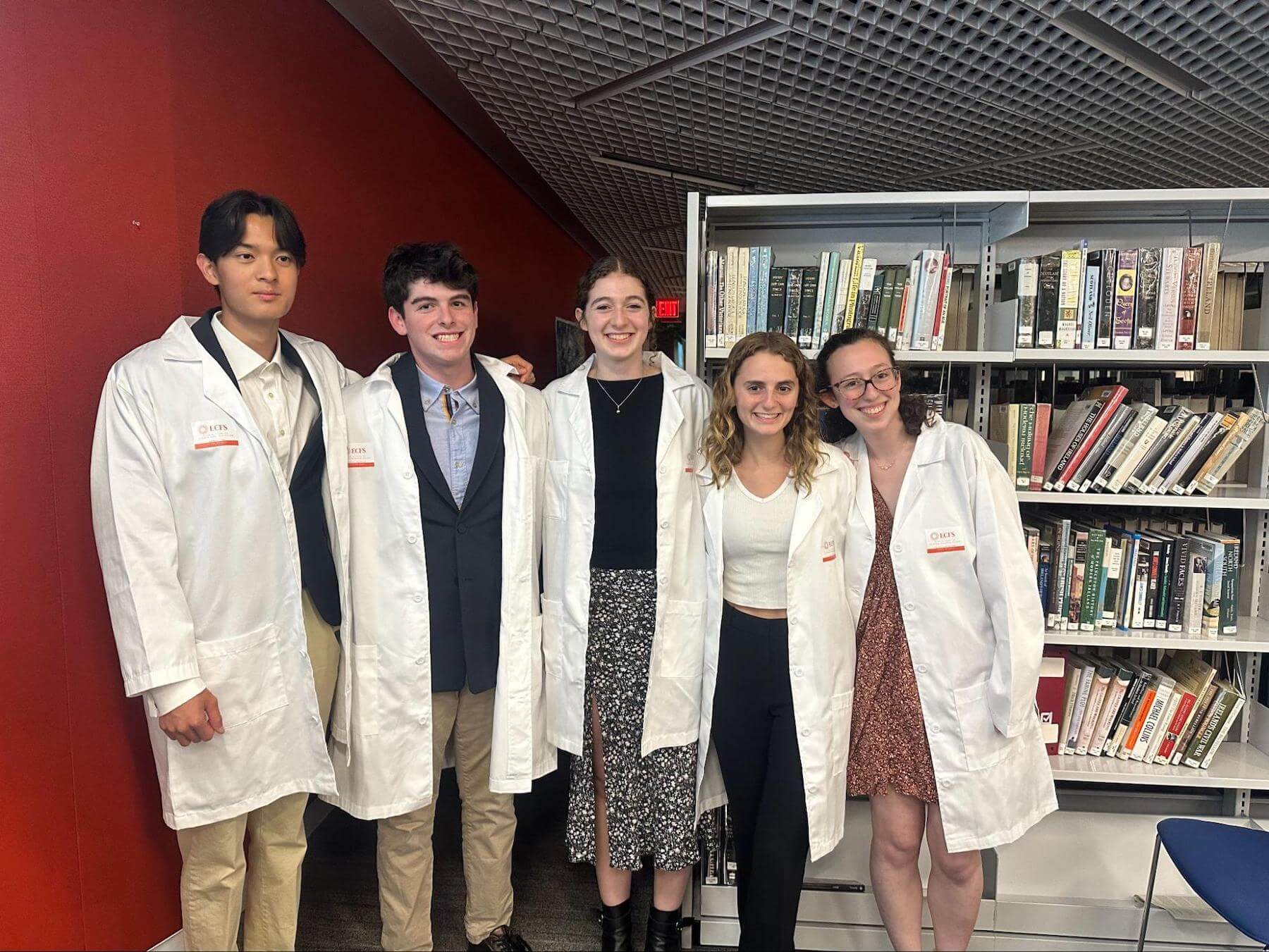
“Many Science Research 2 students will reference their work and process in college applications, and several have told me that, once at college, they have easily gotten lab internships and sometimes jobs based on the work they did in labs while attending Fieldston,” Waldman says. “Some of them become co-authors on papers from their labs, and a small number of them enter their work in the Regeneron Science Talent Search or other science fairs.”
Even if they haven’t pursued the science research program, other Fieldston Upper students close the academic year with the Science Expo. 9th–11th Graders taking laboratory science courses work in groups of two to three to design, execute, and analyze an experiment of their own creation. The annual Expo allows students to demonstrate the knowledge and skills developed in their courses, as students often explain their findings to passersby in the event’s convention-style setup.
“This hands-on experience is crucial for deepening students’ grasp of scientific principles,” says Science Department Chair Paul Church. “A successful project requires literature review, goal setting, planning timelines, collaboration, and meeting deadlines; it also teaches essential project management skills. It requires innovative thinking as students use their knowledge in new and unexpected ways, fostering a spirit of ingenuity and adaptability.”
Often connecting with peers to gather specific data, students produced experiments this year ranging from how essential oils affect heart rate and blood pressure to how one’s sense of smell helps them perceive the taste of different foods.
“My project is about how listening to certain types of music while studying affects test scores,” says Layla F. ’27. “Watching the results has been fascinating, and I have used them to approach things differently in my everyday life. For example, many of the people we tested did really well when listening to no music while studying. This experiment taught me that it is better not to listen to music while studying, and now I can use this information to approach my study strategies differently.”
Other Science Expo project topics included the mitigation of urban flooding, maximizing wind energy, color theory in plants, the chemistry of sports drinks, and more.
“Many of the projects involve the use of specialized software, laboratory equipment, and other technological tools, providing practical experience with the tools and techniques used in scientific research,” Church adds. “Using statistical analysis to analyze and interpret data also furthers students’ analytical skills. At the Expo itself, students demonstrate their communication skills through both written and oral presentations.”
Science coursework focused on critical thinking and data analysis results in comprehensive experiments and research. By the end of the academic year, students ultimately learn that applying these scientific concepts can lead to many solutions to challenges encountered in the laboratory and beyond.
“There is a huge difference between learning something in a classroom and utilizing it in everyday life,” Layla says. “The Expo challenges us to use what we have learned and experiment with it in our own creative way.”
